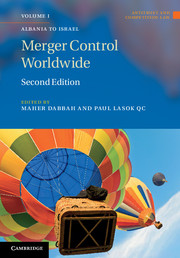Book contents
- Frontmatter
- Contents
- Preface
- List of Contributors
- Table of cases
- Table of Legislation and Official Guidance
- Introduction
- Albania
- Argentina
- Armenia (Republic of Armenia)
- Australia
- Austria
- Barbados
- Belgium
- Bosnia and Herzegovina
- Brazil
- Bulgaria (Republic of Bulgaria)
- Canada
- Chile
- China*
- Costa Rica
- Croatia
- Cyprus (Republic of Cyprus)
- Czech Republic
- Denmark
- Estonia
- European Economic Area
- European Union
- Finland
- France
- Germany (Federal Republic of Germany)
- Greece
- Hong Kong
- Hungary
- Iceland
- India
- Indonesia (Republic of Indonesia)
- Ireland
- Israel
- Italy
- Japan
- Kenya
- Korea
- Latvia
- Lithuania
- Macedonia (Republic of Macedonia)
- Malta
- Mexico
- Netherlands (The Netherlands)
- New Zealand
- Norway
- Pakistan
- Peru
- Philippines (Republic of the Philippines)
- Poland
- Portugal
- Romania
- Russia
- Serbia
- Singapore
- Slovakia (Slovak Republic)
- Slovenia
- South Africa
- Spain
- Sri Lanka
- Sweden
- Switzerland
- Taiwan
- Thailand
- Tunisia (Republic of Tunisia)
- Turkey
- Ukraine
- United Kingdom
- United States of America
- Uzbekistan
- Venezuela
- Zambia
- Index
Thailand
Published online by Cambridge University Press: 05 November 2014
- Frontmatter
- Contents
- Preface
- List of Contributors
- Table of cases
- Table of Legislation and Official Guidance
- Introduction
- Albania
- Argentina
- Armenia (Republic of Armenia)
- Australia
- Austria
- Barbados
- Belgium
- Bosnia and Herzegovina
- Brazil
- Bulgaria (Republic of Bulgaria)
- Canada
- Chile
- China*
- Costa Rica
- Croatia
- Cyprus (Republic of Cyprus)
- Czech Republic
- Denmark
- Estonia
- European Economic Area
- European Union
- Finland
- France
- Germany (Federal Republic of Germany)
- Greece
- Hong Kong
- Hungary
- Iceland
- India
- Indonesia (Republic of Indonesia)
- Ireland
- Israel
- Italy
- Japan
- Kenya
- Korea
- Latvia
- Lithuania
- Macedonia (Republic of Macedonia)
- Malta
- Mexico
- Netherlands (The Netherlands)
- New Zealand
- Norway
- Pakistan
- Peru
- Philippines (Republic of the Philippines)
- Poland
- Portugal
- Romania
- Russia
- Serbia
- Singapore
- Slovakia (Slovak Republic)
- Slovenia
- South Africa
- Spain
- Sri Lanka
- Sweden
- Switzerland
- Taiwan
- Thailand
- Tunisia (Republic of Tunisia)
- Turkey
- Ukraine
- United Kingdom
- United States of America
- Uzbekistan
- Venezuela
- Zambia
- Index
Summary
Relevant legislation and statutory standards
Section 26 of the Trade Competition Act, B.E. 2542 (1999) (‘the Act’), prohibits business operators from merging businesses where it might create a monopoly or unfair competition unless permission is obtained from the Trade Competition Board (‘the Board’). As the supporting legislation which is required to prescribe the factors which constitute a monopoly and/or unfair competition has not been enacted, Section 26 is for practical purposes not yet effective. The required supporting legislation is expected to be enacted in the relatively near future, but the authorities have not provided a firm estimate of when.
The Act prescribes that the following actions constitute a merger of businesses:
a manufacturer combining with a manufacturer, a seller combining with a seller, a manufacturer combining with a seller, or a service provider combining with a service provider, resulting in one business remaining unaltered and another business terminating or becoming a new business;
a purchase of all or some of the assets of another business in order to control policy, business administration, administration or management;
a purchase of all or some of the shares of another business in order to control policy, business administration, administration or management.
- Type
- Chapter
- Information
- Merger Control Worldwide , pp. 1406 - 1413Publisher: Cambridge University PressPrint publication year: 2012



